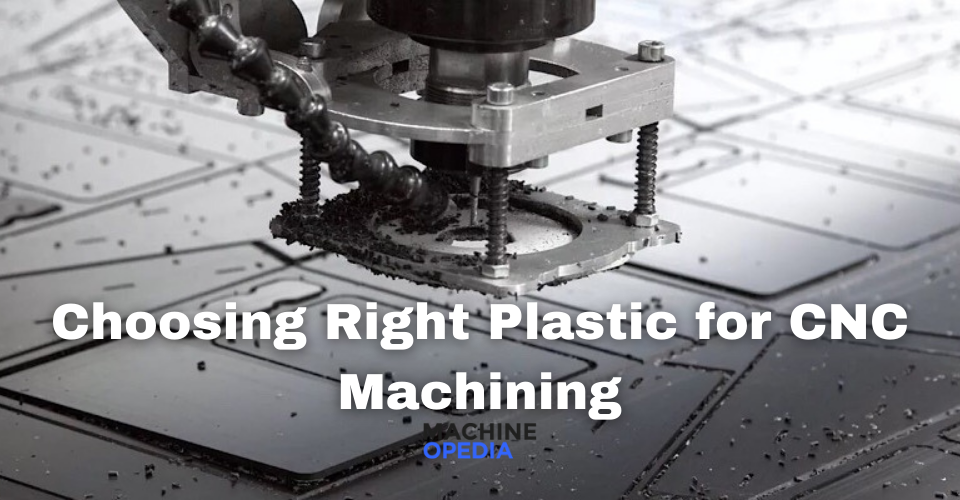
The industrial era lately is heavily dependent on CNC machining to work on a variety of projects and for manufacturing hundreds of products. As they have become a staple for a wide array of disciplines, they need specialized parts as well for the smooth running of operations. To make the entire process worthwhile, it is important to pick high-quality materials for CNC parts. Though there is a plethora of materials available in the market for the CNC machining parts, including aluminum, stainless steel, and metals, the plastics are considered the most versatile out of them. There is a huge variety of machinable plastic types, all of which have specific benefits to serve. This article would give you the ultimate guidance about selecting the right plastic material for a CNC job.
Picking the right material for plastic CNC parts would make a huge difference between mediocre results and optimal outcomes. However, it also depends upon the application you are going to use the material for. Some plastic materials might be a good fit for your use, and the same might not suit your applications. To comprehend what could be the best fit for your application, must consider the following factors.
You need to consider the outside and indoor environments. You need to look upon if the machinable plastic types you are working with can withstand moisture, rusting, or any external temperatures while keeping the structural integrity maintained.
Check the tolerance level of the machinable plastic types, whether they can bear the high-stress loads. This is because some materials might not handle the stress and break subsequently.
Check for the strength, brittleness, corrosion resistance, and galvanic corrosion of the material you have chosen, as these properties help with the fastening.
Must consider the operating temperatures as well for the plastic CNC machining.
Consider if the plastic can withstand high-heat conditions and pick the one that suits your requirement. If you think heat tolerance is not required for your application, then you pick any other material for plastic CNC parts.
There are a variety of materials provided by the reliable Plastic CNC machining parts exporter that again proves the versatility of the plastic material. Let’s explore here some of the major types that suits your CNC machining application and some of their benefits and drawbacks.
ABS is one of the most prevalent types of plastic. They are also commonly used for plastic CNC machining because they are considered optimal for pre-molding and purpose prototyping. Besides, they are also one of the most reasonable options for CNC machining to pick. Despite being so affordable, they offer electrical resistance and high impact resistance due to their toughness. Still, they are not chemical or abrasion-resistant, which means they should not be used for such applications where the chemical is used. ABS is mostly used for injection molding and to manufacture electronics enclosures.
Nylon is another most commonly used material for plastic CNC parts. These are mostly preferred by the professional CNC machinist because of their high tensile strength and durability. Besides, they also have high-grade chemical and wear resistance. But, one drawback of nylon is that it would swell if exposed to moisture. Their applications include circuit board mounting hardware, making od automobile engine compartment components, working on medical devices, and zip ties.
Acrylic is famous for many names, such as Plexiglass or Lucite. This plastic has the best resistance against impact and scratches. But they can also be brittle, and it is their drawback and the reason for their cracking or shattering. This transparent plastic is, however, most suitable for the uses that need optical transparency. They are also most commonly used as an alternative for light pipes.
Delrin can be a good choice for plastic CNC machining, where lots of friction is required. They are known for their stiffness and excellent dimensional stability. One problem with the Derlin plastic when it comes to machining is that they can be a bit difficult to link. They are usually employed in fasteners, bearings, and bushings, etc.
High-density polyethylene is one of the most rampantly used plastics in every household. They have a slippery surface and works well with chemicals, and have great electrical insulation. But HDPE might be a bit difficult to machine. This is why they are usually employed for fluid applications, such as plastic bottles, low fluid pipes, etc. The HDPE has not really a great strength.
Polycarbonate is another sturdiest and robust form of plastic among other machinable plastic types. Though they are inclined to scratches, they have extraordinary impact resistance and stiffness. They are most commonly employed for the fabrication of safety glasses, light pipes, bulletproof glasses, etc.
